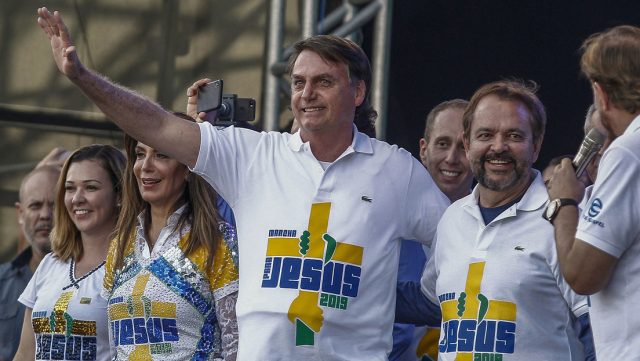The broadcast of an audio was enough to force the president of Brazil, Jair Bolsonaro, to accept the resignation of his Minister of Education, Milton Ribeiro, and unleash a political crisis that impacts his race for re-election.
«My priority is to attend, first, to the municipalities that need the most, and second, to all the friends of Pastor Gilmar», says Ribeiro in the recording that was published last week by the newspaper Folha de Sao Paulo and that, triggered a serious corruption scandal just six months before the presidential elections on October 2, since the official claimed that he was acting on the instructions of the president, which he later denied.
The ‘Gilmar’ of the audio is Gilmar Santos, who together with Arilton Moura are accused of having formed a «parallel cabinet» that, with the complicity of Ribeiro, managed federal resources from the Ministry of Education to favor «friends» of his Church, informed RT.
Santos, Moura and Ribeiro are evangelical pastors and are part of the growing power that this type of religious representatives have acquired during the Bolsonaro government.
The president defended Ribeiro until the last moment, but the scandal reached such a magnitude that even other evangelical politicians pressured him to have the pastor leave the cabinet.
The crisis is also evident in the fact that Ribeiro is the fourth Minister of Education that Bolsonaro has had in his little more than three years in government. His predecessor was another evangelical pastor, Carlos Alberto Decotelli, whose appointment only lasted five days and he did not even take the oath of office since it was shown that he had falsified his curriculum vitae to show off non-existent doctorates and postdoctorates.
The first was Ricardo Vélez Rodríguez, a far-right Colombian theologian who became a Brazilian national and who only remained in government for four months, from January to April 2019, because he provoked a series of controversies for wanting to defend the military dictatorship (1965 -1985) in public education, and said that he would end the «Marxist influence» in schools; and also that he would not give any value to the diversity of Brazil and put the capo Pablo Escobar as an example of behavior to avoid drug use.
In his place, the economist Ariel Weintraub was appointed, who held the position for 14 months, enough time for the controversial saga of his predecessor to continue. In his case, for promoting the closure of Congress and the Supreme Court. He also requested the arrest of the judges of the country’s highest body of Justice.
In his letter of resignation, Ribeiro confirmed that he is innocent of the accusations against him and that, for now, they interrupted his political career.
Campaign
Bolsonaro’s new crisis broke out just at a time when he was preparing his campaign for re-election in an adverse scenario.
According to the polls, former President Luiz Inacio Lula da Silva leads the race with a voting intention that ranges between 35% and 42%, while Bolsonaro is in second place with a range that goes from 25% to 34%. In a distant third place is the former magistrate and former Minister of Justice, Sergio Moro, who does not exceed 10%.
If on October 2 no one gets 50% plus one of the votes, then a second round will have to be held on October 30.
In this process, the evangelical vote is fundamental, since it involves a universe of 70 million people (a third of the population). And everyday there are more and more, so much so, that in a decade they could even outnumber the Catholics.
A survey by the consultancy firm PoderData revealed that, here, Bolsonaro continues to lead sympathy, since 44% of evangelicals prefer his re-election (70% voted for him in 2018) and only 32% support Lula.
The political influence of evangelicals is also reflected in the 105 seats in the Chamber of Deputies and the 15 in the Senate that they already occupy and that represent 20% of Congress.
That is why the corruption scandal of a minister who is also a pastor, and who is now accused of influence peddling to benefit other evangelical leaders, particularly affects the campaign, both because of the political erosion on a government that pretends to be re-elected and for the deterioration of the image of the religious pastors who increasingly aspire to political positions in Brazil.
Contradictions in Brazil
One of the problems for Bolsonaro with this case is that he came to power with the promise of ending corruption in Brazil, which in the 2018 campaigns was one of the central issues for Brazilian society.
But, in addition to the endless scandals that have surrounded his administration, now an audio appears, in which one of his pastor ministers assures that he is acting on behalf of the president himself to benefit friends. To make matters worse, the mayor of the Luís Domingues municipality (Maranhao state) revealed that Ribeiro had asked him for a bribe «in gold».
To this was added his initial reaction, since he rejected the complaint that had already reached the Federal Supreme Court. «I put my face in the fire for Milton, what they are doing with him is cowardice», said the president. The ‘iron defense’ did not last long.
The claims that weighed the most were, precisely, those of other evangelical leaders aware that this scandal could cost them votes. «I ask you, please, to discharge him (from office) until the end of the investigations, because we evangelicals are bleeding. If his innocence is proven, he will return to office», warned the pastor and deputy Marco Feliciano.
Bolsonaro no longer had room to support Ribeiro. Just last March 9, he had met with influential evangelical pastors and politicians to promise them absolute loyalty.
“I lead the nation in the direction you want. Is it easy? It is not. But we know and we have the strength to seek to do the best for our country», he stated in a message in which he veiled criticism of Lula.
«If that person, one day, that party, that ideology, that gang, steals our freedom, then it complicates the situation (…) our decisions now will determine whether or not we will have a life of freedom above all else», he said.
The pastors in Brazil, in turn, endorsed an alliance that will be decisive for the next elections.



